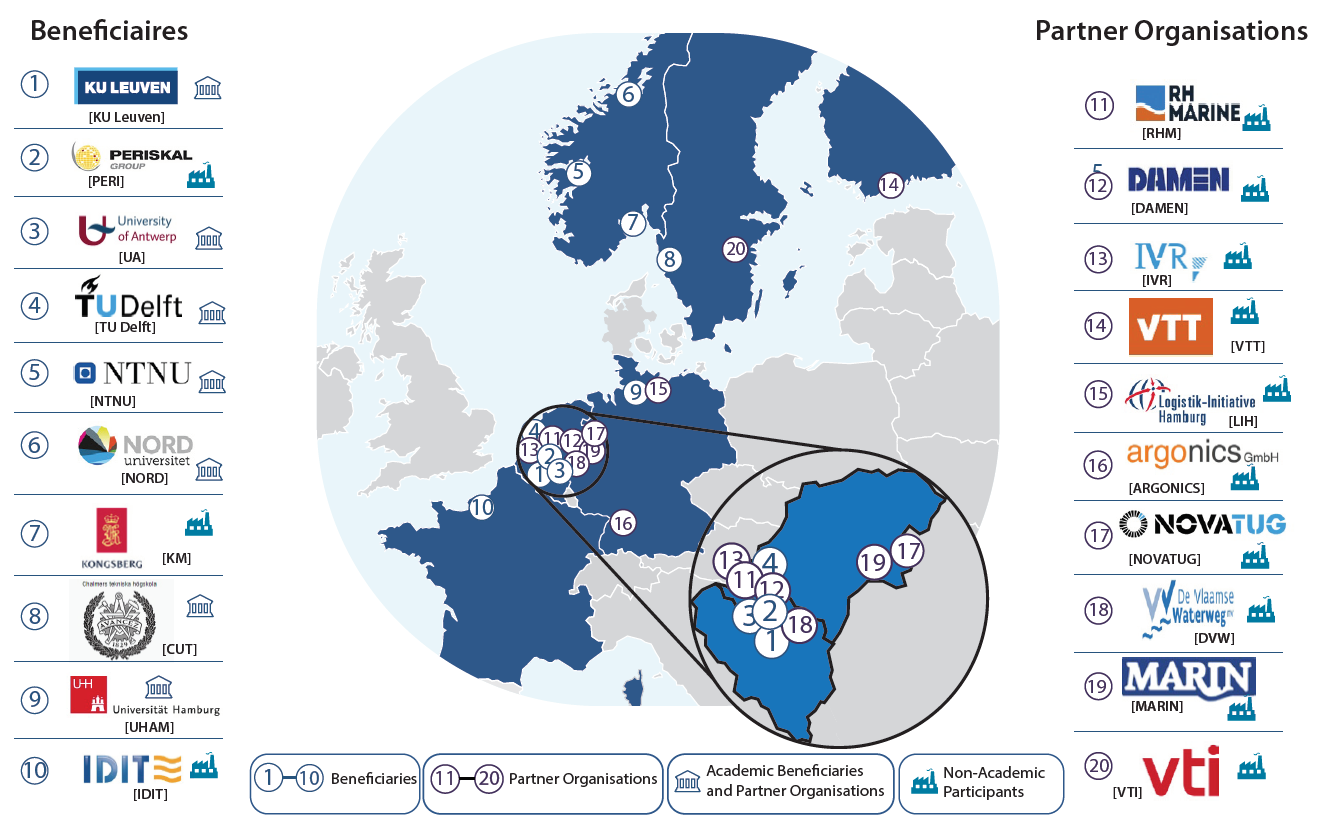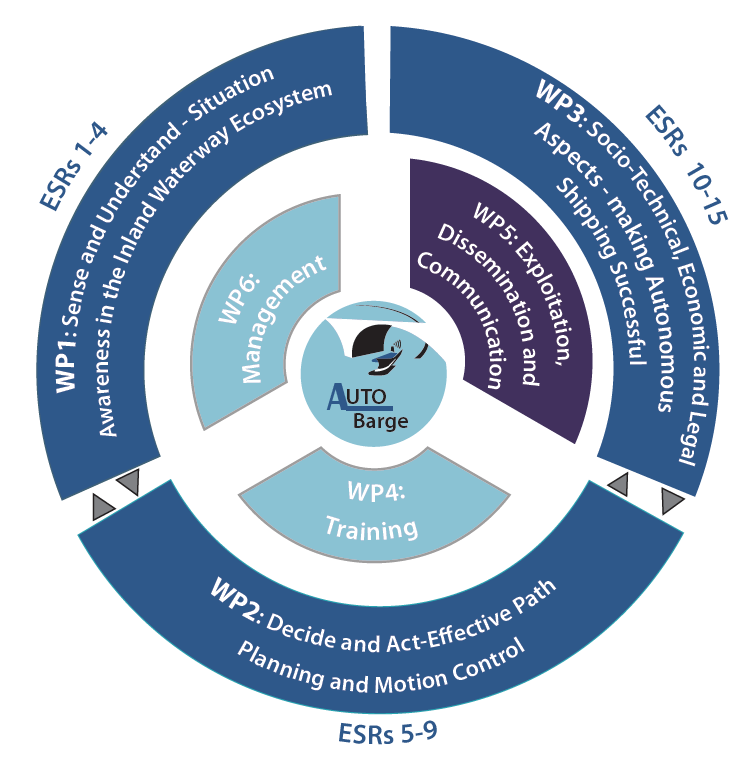AUTOBarge
AUTOBarge unites 10 beneficiaries as well as 10 partners throughout Europe to build-up a highly skilled workforce for the autonomous inland waterway transport sector to explore new possibilities for mass autonomous shipping.
Short info
Project period: October 2021 – September 2025
Funding Programme: The project is co-financed by the European Union within the framework of the EU Horizon 2020 MSCA project.
Project budget: Total around EUR 1.6 million, funding 100%.
Project focus:
Build-up a highly skilled workforce for the autonomous inland waterway transport sector
Further develop the essential building blocks of the SUDA-model of an AV (Sense the environment, Understand the environment, decide about the next action/ maneuver to take, Act according to that decision) that are needed for an autonomous vessel to take over the role of the human captain and crew
Address the many other socio-technical, logistic, economic, and regulatory conditions that need to be met for the successful and future-proof implementation of autonomous vessels in the inland-waterway transport sector
Creation of 15 doctoral positions for networked research within the framework of the collaborative project
Project partners and associated partners
The project consortium consists of 10 beneficiaries from 6 different countries (Belgium, Netherlands, Norway, Sweden, Germany, France) and combines 7 universities, 2 high-technology companies and 1 non-university research institute:
- KU Leuven (University of Leuven), BE
- PERISKAL, BE
- University of Antwerp, BE
- TU Delft (Delft University of Technology), NL
- The Norwegian University of Science and Technology (NTNU), NO
- Nord University, NO
- Kongsberg Maritime (KM), NO
- Chalmers University of Technology, SE
- University of Hamburg, DE
- Institut du Droit International des Transports, FR
The consortium is completed by 10 not funded Partner Organisations that include 4 companies, 3 non-university research institutes, 2 network/stakeholder organisations, and 1 governmental organisation:
- RH Marine
- Damen Shipyards
- IVR
- VTT Technical Research Centre of Finland Ltd.
- Logistik-Initiative Hamburg Management GmbH
- ARGONICS GMBH
- NOVATUG
- De Vlaamse Waterweg
- Maritime Research Institute Netherlands (MARIN)
- Swedish National Road and Transport Research Institute (VTI)
In the project, Logistik-Initiative Hamburg plays a supporting role by sharing experiences and knowledge from ongoing and completed relevant projects (e.g. AVATAR, WACABA) with the project partners. Furthermore, Logistik-Initiative Hamburg promotes the active exchange between industry and science by providing critical insights to the PhD students for their research.

Project contents & goals
AUTOBarge unites some of the best and most relevant of European industry and the key academic players, guaranteeing not only an exciting interdisciplinary, intersectoral research-and-training programme, but also a head-start for bringing about the successful application of autonomy in inland-waterway transport.
AUTOBarge offers the first-ever training programme for the application of unmanned or autonomous vessels for smart inland shipping and their role in the overall multi-modal transport activity in Europe. The interdisciplinary needs required to realise AUTOBarge’s overall aim are of such complexity that we see a large training network involving some of Europe’s flagship companies – such as Kongsberg Maritime and Damen Shipyards – together with leading European universities in the field – like KU Leuven and NTNU – and industry-oriented research organisation – among which IDIT and VTT – as the best way to tackle the related Scientific/Technical (S/T) challenges, which are briefly described as follows and which will be the aim of the project’s three Scientific/Technical (S/T) WPs:
Challenge 1 (WP1): Maximize the situational awareness (Sense and Understand) of an unmanned or autonomous inland vessel by covering the state and manoeuvrability of the vessel itself, the location and motion of other vessels, other relevant static and moving objects in the vicinity, features like buoys or traffic signs, as well as the wireless communication of information between the different waterway actors.
Challenge 2 (WP2): Exploit the above situational awareness (Decide and Act) obtained for a safe, robust and energy-efficient path planning and motion control of the autonomous inland vessel with a focus on model predictive control, control methods supported by real-time machine learning, energy-efficiency, and fault identification and isolation schemes such that those do not affect the operation of autonomous vessels in a negative way.
Challenge 3 (WP3): In-depth analysis of the socio-technical, economic and legal aspects that are needed to make autonomous inland shipping a success in the near future, including safety assurance, collaborative decision making for maximized performance, logistics, economic benefits, and the required changes to the regulatory framework.




